This article is the second in a two-part series that will examine views of China's leadership around the world. This article looks at views of China's leadership in its own backyard, and in sub-Saharan Africa and the Middle East.
WASHINGTON, D.C. -- Gallup Polls conducted worldwide show China's leadership is better known and better regarded in other regions of the world than it is in the Americas and Europe.
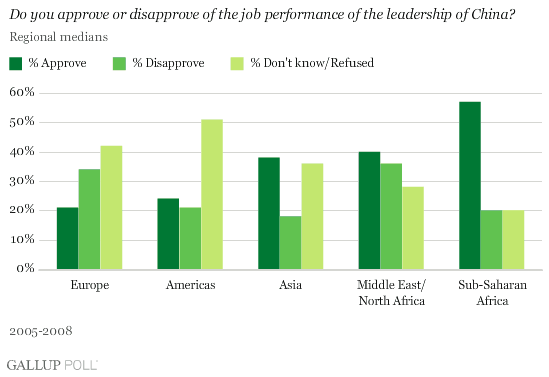
In Asia and in the Middle East/North Africa region, approval of China's leadership was nearly twice as high as it was in Europe and the Americas. In sub-Saharan Africa, approval of China's leadership is nearly three times as high.
Asia
With the country's emergence as a global economic power, China's economic, political, and social ties with many of its Asian neighbors have grown, and in turn, the nature of its relationship with these countries has changed from one of "estrangement" to "amity."
The median approval of the China's leadership in Asia is 38%, which is on par with approval in the Middle East/North Africa but significantly lower than that in sub-Saharan Africa.
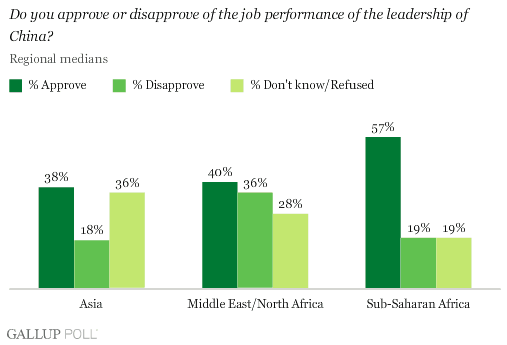
Within the region, China has arguably gained the most influence in Southeast Asia, where economic interdependence and mutual investment is growing. Bilateral trade between China and the countries in the Association of Southeast Asian Nations (ASEAN) has reportedly grown 20% each year in the last decade -- reaching nearly $140 billion in 2006. This Asian subregion is also where approval of China's leadership is highest; median approval for the nine countries surveyed in Southeast Asia is 52%.
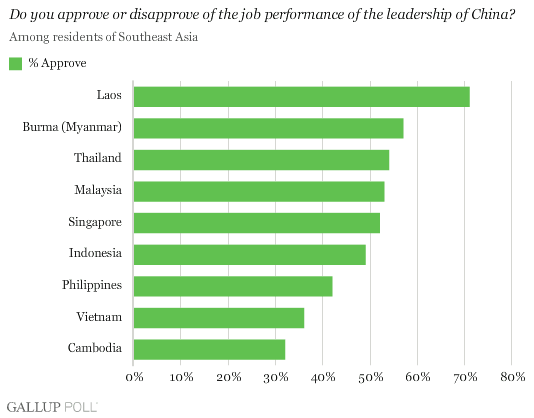
As a whole, residents in Asia are twice as likely to approve as disapprove of China's leadership. Majorities in only 11 of the 33 Asian countries surveyed say they approve of China's leadership, but residents in 25 countries are more likely to say they approve than disapprove. At the country level, approval is highest in Laos (71%) and lowest in India (18%), Japan (16%), and Georgia (16%).
The Middle East/North Africa
In recent years, China has been pursuing stronger economic and diplomatic ties with several countries in the Middle East/North Africa, which supplies the country with more than half of its oil. Overall, residents in the Middle East/North Africa region are divided on the performance of China's leadership: median approval is 40% and median disapproval is 36%.
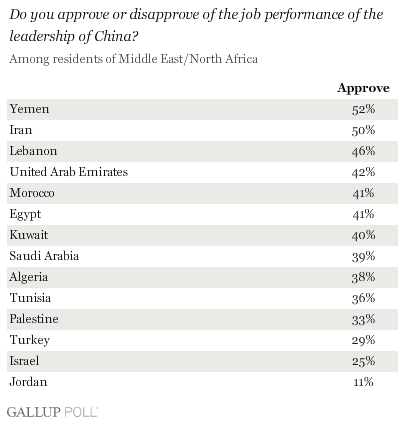
In 7 of the 14 countries surveyed in the region, respondents were more likely to approve than disapprove of China's leadership. Approval is highest in two countries with which China has well-established relations: Yemen (52%) and Iran (50%). Approval is lowest in Israel (25%) and Jordan (11%).
Sub-Saharan Africa
China's presence is nearly ubiquitous in sub-Saharan Africa -- and not just in oil-rich states. According to the Council on Foreign Relations, China's foreign direct investment in Africa represented $900 million of the continent's $15 billion total in 2004 and the country is the continent's third most-important trading partner.
Its leadership gets relatively high approval from sub-Saharan African citizens; median approval is 57%. But residents in the region tend to be just as approving of the leaderships of several major nations that provide aid and investment in sub-Saharan Africa.
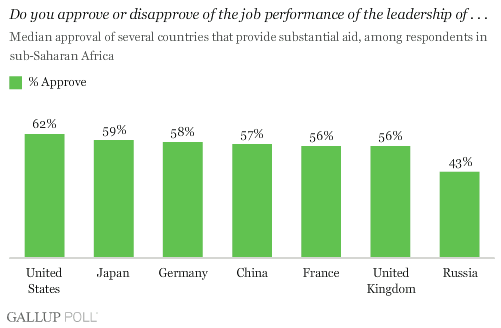
In sub-Saharan Africa, majorities in 24 of the 31 countries surveyed say they approve of China's leadership. Approval is highest in nations such as Congo (82%), Mali (81%), Central African Republic (75%), Kenya (74%), and Cameroon (74%).
But in Angola (48%), Botswana (47%), Namibia (42%), Zimbabwe (40%), and Zambia (37%), less than a majority approve of China's leadership. Leadership approval is low in Liberia (27%) and South Africa (23%), but high percentages in these countries say they don't have an opinion, and they are still more likely to approve than disapprove.
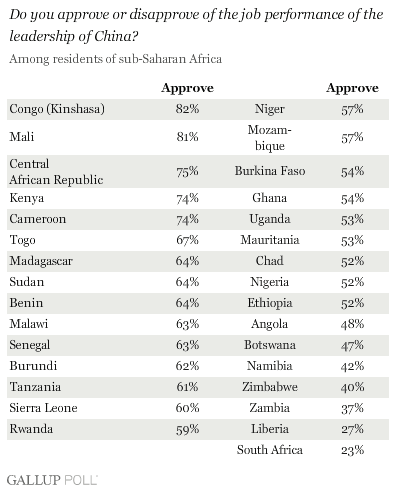
Bottom Line
Gallup's data indicate that while China's leadership is better regarded in certain regions around the world, it remains a great unknown to many of the world's citizens -- even in places where its leadership meets with more approval. This suggests that the image of China's leadership remains unformed in many minds, which presents the country's leaders with a global opportunity to change them.
Survey Methods
Results are based on telephone and face-to-face interviews conducted throughout 2005, 2006, 2007, and 2008. Randomly selected sample sizes typically number 1,000 residents, aged 15 and older, in the 139 countries polled. For results based on samples of this size, one can say with 95% confidence that the maximum error attributable to sampling and other random effects is ±3 percentage points. In Angola and Congo (Kinshasa), surveys were conducted in urban areas. Surveys in Chad and Sudan did not include Darfur. The margin of error in countries in sub-Saharan Africa is ±5. In addition to sampling error, question wording and practical difficulties in conducting surveys can introduce error or bias into the findings of public opinion polls.